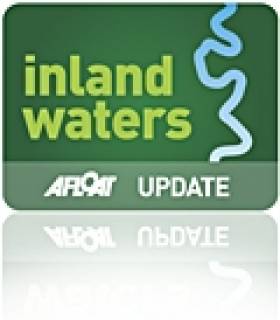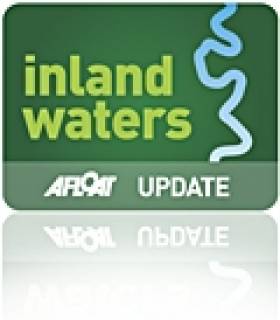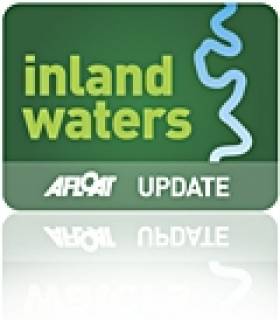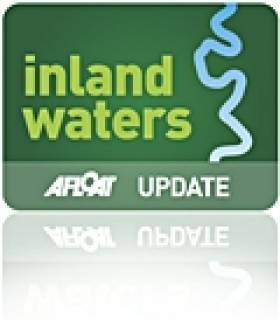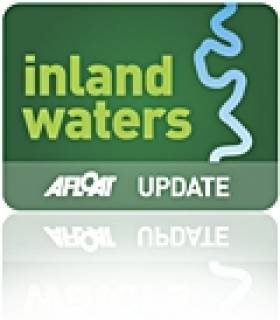Displaying items by tag: Byelaws
IWAI Urges Participation In Canal Bye-Laws Consultation
#Canals - In welcoming Waterways Ireland's draft Corporate Plan for 2014-2016, the Inland Waterways Association of Ireland (IWAI) has urged its members to participate on the public consultation on the introduction of new canal bye-laws.
As previously reported on Afloat.ie, submissions are being sought on the changes to the Draft Canals Act 1986 (Amended) Bye-Laws - covering the Grand Canal, Royal Canal and Barrow Navigation - with the consultation period closing on 3 February 2014.
IWAI president Carmel Meegan is encouraging all members of the association and the general public to engage in the consultation and respond before the closing date.
"Key objectives of the process must be to ensure that the canal regulations encourage and nurture the growth of domestic and international boat tourism on these fine navigations," said Meegan.
The bye-laws can be viewed on the Waterways Ireland website HERE or by arrangement at Waterways Ireland Offices in Dublin (Tel: 01 882 3301) and
Enniskillen (Tel: +44 (0)2866 346 214).
The IWAI says it will prepare a response to the proposed bye-laws.
Enforcement of Mooring Bye-laws on Grand & Royal Canal & Barrow Navigation
#byelaws – Waterways Ireland will begin enforcement of the mooring Bye-Laws on the Barrow Navigation, Grand Canal and Royal Canal on the 19th March 2013. A Marine Notice will be issued on the 19th March to this effect.
The enforcement process will begin with non-permitted, sunken and abandoned boats already on the system. The first step in the process is notification. Continued non-compliance with the Bye-laws may result in the craft being removed from the navigation and stored at the owners cost.
A one year permit for passage and 5 day mooring costs €126. A year-long mooring permit for a single location costs €152. For boats already on the canal system, both permits must be applied for in advance of the 19th March 2013 and be on display on the boat by the 31st March 2013.
New boats visiting the Grand Canal, Royal Canal or Barrow Navigation for longer than 1 month may apply for the CMP in advance of arrival on the system and must apply for the Extended Mooring Permit as soon as they plan to remain for longer than five days in a single location.
The application process is simple using a form that can be downloaded from www.waterwaysireland.org or sent out by post from Waterways Ireland Tullamore (Tel no 057 9352300).
Waterways Ireland has extended the number of Authorised Officers, who under the Bye-laws have the authority to undertake enforcement.
More information is available from Shane Anderson, Assistant Inspector of Navigation: Tel no +353 (0)87 286 5726, Email [email protected] .
#inland – Boat owners need to be careful about not overstaying at any one mooring after Waterways Ireland successfully undertook the prosecution of two boats owners on Lough Erne for breaching the 48 hour mooring Bye-law. The defendants received a caution and undertook to comply with the Bye-laws in the future.
Waterways Ireland communicates regularly with boat owners about the Bye-laws and has produced a publication "Good Boating Guide" advising boat owners of the Bye-laws on Lough Erne.
Having recorded breaches of the 48 hour mooring Bye-laws, Waterways Ireland wrote to the boat owners advising of the breach and after subsequent breaches were noted, Waterways Ireland reluctantly brought the prosecutions under the Bye-laws.
The Magistrate, Mr. Kennedy, commented that "the Prosecutions were properly brought and it is important that people comply with the Bye-laws. "
Brian D'Arcy, Waterways Ireland's Director of Operations stated "Waterways Ireland had no option but to prosecute following the increasing numbers of local boat owners abusing moorings provided for visiting tourist boats. Waterways Ireland provides moorings free of charge to enable tourists and touring boat owners to access attractions, services, towns and villages. Particularly in Enniskillen, the moorings facilitate the tourism economy as boaters spend in shops and restaurants; reduced access means less income for the town. Waterways Ireland would like to ensure all boat owners are made aware of their responsibilities when using public moorings and do not leave their boats moored in one location on a public mooring for more than 48 hours."
For more information boaters can download a copy of the Good Boaters Guide from the Waterways Ireland website or order a copy free from the Webshop www.waterwaysireland.org.
Sailing Body Responds to Draft Waterways Bye-Laws
The Irish Sailing Association (ISA) says it sees no value registering small craft that launch from clubs and training centres on inland waterways. The sailing body comments come as part of a Public Consultation programme on proposed new Bye-laws for all seven Irish waterways. Waterways Ireland has commenced the first Phase of a review of bye-laws under its remit. Bye-laws facilitate the management of a waterway, clearly outlining the roles and responsibility of Waterways Ireland and all the people involved in using the navigation, whether for recreational or commercial purposes. The association says the new bye laws alos place an added administrative burden on volunteers when organising events. "The requirement to apply for permission to run every event on a weekly basis will create significant administrative workloads on already over burdened volunteers", it said. The full ISA submission is below:
General Observations
1. Definition of Craft Types
There are no fewer then 14 definitions describing different craft types referred to in the bye- laws. Many of the definitions do not adequately describe the type of craft they are referring to, and have definitions within definitions. It difficult to understand which byelaws are referring to which type of craft – this will lead to confusion and as a result non compliance.
For example: a. 'Pleasure Craft' includes personal watercraft and fast power craft'. Pleasure Craft would imply a craft used for pleasure purposes, and there are already definitions for personal watercraft and fast power craft described – so why duplicate?
b. 'Vessel' means every description of craft including non-displacement craft and sea planes but does not include a boat or personal water craft' A non displacement craft is included under the definition of 'craft' so why mention it? You also need to look up the definition for a 'boat' and 'personal watercraft' before you understand which types of craft are being referred to as a 'vessel'.
2. Insurance
We are fully behind the principal that every craft should have suitable insurance. However we believe this is a matter for the users, owners and organisations. We can see no good reason why Waterways Ireland need to be sent policies in 'original certificate form'. This puts the responsibility and hence the liability of adequate insurance onto Waterways Ireland and will require a significant bureaucratic overhead. It could easily be made an offence not to have insurance and leave it at that.
3. Duplication of Existing Legislation
Much of the content of the draft byelaws proposed is already covered under existing legislation. (eg the wearing of personal floatation devices, age limits for driving powered craft etc.). Duplication of this legislation within the bye laws will do nothing to encourage compliance, and will mean a revision of the byelaws every time there is a change in legislation.
4. Over Regulation/confusion
The draft byelaws as presented contain 32 pages of 'small print' regulations. Some of the terminology and definition used is legalistic and confusing. It will be a very difficult task to educate the waterways users as to their responsibilities towards the byelaws, and an even bigger task to enforce them.
There has been no mention of a plan for implementing the byelaws, and we would have concerns that Waterways Ireland do not have a plan or adequate resource to communicate sufficiently the detail of the byelaws, or to enforce compliance.
5. Safety
It has been shown time and time again that regulation used to manage activity on the water does little or nothing to improve safety standards unless there is sufficient resource to enforce it. The attempt within the bye laws to incorporate a 'one size fits all' set of regulations to manage activities on the waterways is inappropriate, unnecessary and will be impossible to enforce. As such it will lead to confusion and non compliance.
There are some 'bottle neck' areas of congestion, where more stringent control measures may be necessary in order to encourage responsible participation and enjoyment. We recommend a different set of regulations be developed for known trouble spots, leaving the majority of the waterways relatively unrestricted.
6. Link with existing Local Authority byelaws
In recent years, Local Authorities around the country have developed byelaws of their own to manage access to and activity on the waterways, harbours and beaches under their jurisdiction.
We are concerned that there appears to have been little consultation or coordination with local authorities who already have byelaws established, particularly counties which boarder Waterways Ireland navigation. This could potentially lead to one set of regulations applying whilst launching your craft from a local authority controlled slipway, whilst another set of regulations applying once under way on the water.
We strongly urge waterways Ireland to liaise with local authorities to ensure their byelaws are consistent with those already established.
Feedback on Specific Byelaws
(6) Registration The proposal set out in bye-law 6 needs a total revision.
a. Compulsory Registration
The ISA is not opposed to the principle of registration of vessels provided it is equitable, has a purpose (other than taxation) and is required only where necessary. Otherwise there will be a strong disincentive to register, and the cost of tracking down and seeking to make vessel owners compliant will exceed any possible benefit.
We do not see any value in the need for registering small craft that launch from clubs and training centres, which are under the control of and/or are participating in an organised activity.
b. ValidityPeriod
Where registration is required it is not sufficient to make it valid for a period to be decided by the Chief executive. A validity period should be clearly identified (5 years would seem appropriate) and communicated to all the keepers of registered craft.
c. Cost
Registration should not be seen as a revenue generator for Waterways Ireland. It should be administered at cost and fees set as such. Again this should not be at the whim of the Chief Executive.
d. Lettering
The proposal for all craft wishing to display their own print of the registration number to have 300mm high numbers (7)(b) port and starboard on the bow, and on the stern is completely ill-conceived. There is an assumption that the number issued by Waterways Ireland (7)(a) is the same size? For smaller craft it is simply not possible, and for larger craft will meet with huge opposition if it is implemented.
e. Insurance
We are fully behind the principal that every craft should have suitable insurance. This is a matter for the users and owners and we can see no good reason why WI need to
be sent this in 'original certificate form'. By checking an insurance policy Waterways Ireland is taking responsibility for ensuring all craft registered have adequate cover for any incident that they are involved with on the waterways. It could easily be made an offence not to have adequate insurance (putting the responsibility on the registered keeper) and leave it at that.
f. Visiting Craft
There are a number of craft that use the waterways occasionally when visiting the area. They are unlikely to have prior knowledge of the byelaws and often will not be in a position to apply for registration three weeks in advance. This will significantly restrict access, and/or encourage non compliance. Temporary visitors will need to be catered for.
g. On-LineRegistration
Waterways Ireland are proudly declaring the development of a 'computerised registration package', yet all registration applications must be submitted by hard copy 'snail mail'. This is not the modern way to do business.
h. Duplication of Registers
The ISA currently operates a Small Craft Register which is available on line and may be used to identify all types of craft. It may be has a five year validity and costs €15. We have the ability to process applications in a day. This is already being used by many local authorities that require permits to launch craft. We would welcome the opportunity to discuss the potential for combining the registers in order to help simplify registration system for the user.
(20) Zoning The ISA would ask Waterways Ireland to consult with us prior to implementing zoning, so we may help to ensure that congested areas are managed in a pro active way to encourage responsible participation, and will not cause confusion and/or unnecessarily restrict activity.
a. Restriction of Craft
Whilst we have no difficulty in 'Zoning' areas in order to pro actively manage use of the waterways in congested areas, it should be stressed that zoning may be required in congested areas in order to 'promote' responsible participation in activities. The current terminology used in the byelaws; 'restrict or prohibit craft from taking part' does not suggest Waterways Ireland is actively looking to promote activities on the waterways.
b. Consistent Markings
The ISA has been working with local authorities on implementing pro active management strategies for the management of beaches and harbours within their jurisdiction. The signage and buoyage for zoned areas need to be consistent with those used by local authorities and we would request that waterways Ireland consult with us prior to developing the infrastructure and management systems required for zoning.
(21) Commercial Operations
a. Voluntary Organisations
Byelaw 21 outlines the requirement to obtain permission to carry on any trade or business. It also mentions that there will be a charge levied in respect of this permission. There are a number of clubs and associations that organise training,
recreational and competitive events for which a charge is levied to the participants. This is not commercial activity, as the charge is to cover the costs of organising the said activity.
We believe it is not the intention of waterways Ireland that these clubs and associations will be charged for organising their activities, however this needs to be clarified.
b. Commercial Operators
The ISA has a number of accredited sailing schools and clubs that operate on the inland waterways. These organisations attract visitors and tourism to the area, whilst at the same time improving safety standards on the waterways.
There should be no charge levied for approved training activity that is carried out by an organisation that is accredited by a national authority and/or has been approved by Waterways Ireland.
(8) Owners, Masters and Crew of Craft
Paragraph (8). Carrying an anchor. It is not general practice in racing yachts to have an anchor stowed in such a position as 'to enable them to be dropped or weighed quickly'. This may incur a €150 fine depending on the interpretation of 'quickly'. This paragraph needs rethinking.
(25) Placing of objects
Clubs and training centres use temporary buoys to mark race courses, training areas etc. It is not reasonable to expect these organisations to apply for permission in writing every time they are involved in organised activity afloat.
(28) Miscellaneous Prohibitions
We note that there does not seem to be any prohibition on the causing of a nuisance for example by noise of engine, generator etc. in a public harbour to other users or any particular restriction on causing such annoyance. We believe such a prohibition should exist.
(32) Events If established organisations are forced to apply for permission for every event they organise their activities will not be sustainable.
a. Notification and Permission
An 'Event' is described as a 'regatta, race or any organised gathering of craft or people for the purpose of competition or display'.
Events in ISA organisations take place on a weekly and sometimes daily basis. They are often weather dependent and organised at short notice. It is unreasonable to expect clubs and associations to apply for permission organise every event, as this will severely restrict their ability to operate.
b. Insurance
ISA Clubs and Associations are fully aware of their responsibilities towards their liability for the organising of events, and carry insurance to cover all of their activities.
Should Waterways Ireland insist on receiving proof of insurance the liability may well be passed on to Waterways Ireland in the event the cover proves to be insufficient.
We recommend that paragraph 32. (6) (b) be removed.
c. Administration
ISA organisations are in the main run by volunteers. The requirement to apply for permission to run every event on a weekly basis will create significant administrative workloads on already over burdened volunteers.
We believe the intent of this bye law was not to restrict the activities of established clubs that organise regular events, and we recommend that for established clubs, training centres and associations affiliated to a recognised authority, a prior agreement be made between Waterways Ireland and the organisation concerned, to allow for the organising of events within agreed parameters without the need to apply for permission.
Waterways Ireland Releases New Bye-laws for Public Consultation (Download HERE)
Waterways Ireland has commenced the first Phase of a Public Consultation programme on proposed new Bye-laws for all seven waterways under its remit. Bye-laws facilitate the management of a waterway, clearly outlining the roles and responsibility of Waterways Ireland and all the people involved in using the navigation, whether for recreational or commercial purposes.
It is intended that the proposed new Bye-Laws will reflect the breadth of modern day use of the waterways; bringing consistency in navigational rules across the waterway network. The new Bye-laws are also expected to facilitate waterway users understanding of their responsibilities in sharing this multi-functional environment. Whether the waterways users are in Killaloe (Shannon Navigation), Coleraine(Lower Bann), or Tullamore (Grand Canal) the same navigational rules will apply. Due to important differences in the enabling legislation in both jurisdictions as well as legislative and court procedures, Waterways Ireland will introduce the new Bye-laws separately in Northern Ireland and Ireland.
Waterways Ireland has considered global best practice, feedback from users and stakeholders and the individual characteristics of the different waterways in developing the new Bye-laws. Future proofing the Bye-laws has been an important feature of the drafting process to ensure they remain fit for purpose.
Phase 1 of the public consultation will be directed at stakeholders; groups who represent the interests of inland waterway users and organisations whose statutory remit could be affected. Stakeholders in each jurisdiction will receive the relevant Bye-laws for a 12 week consultation period. Copies of the Bye-laws of the other jurisdiction are available on request from Waterways Ireland HQ. Stakeholders are requested to hold internal discussions with their constituents before providing a single response to the draft Bye-laws.
The deadline for the end of Phase 1 of the Public Consultation is the 15th October 2010. Thereafter, the entire Bye-laws will undergo a further examination and revision, informed by the analysis of the responses received. Phase 2 will only commence once this full revision has taken place.
Phase 2 of the Public Consultation Programme is public meetings. These meetings will be held along each of the waterways and will be widely advertised and open to all who wish to attend.
Prior to Phase 2 of the consultation programme, copies of the revised Bye-laws will be downloadable from the Waterways Ireland website www.waterwaysireland.org. They will be distributed to all those attending the public meetings. Alternatively, they can be issued to individuals by email or post on request.
The completion of the public consultation programme will be followed by a further revision of the Bye-laws to take account of the points raised at the public meetings. The enactment of the legislation in each jurisdiction will follow.
Please find attached below the draft Waterways Ireland Bye-Laws & associated documents which are intended to improve the management of all seven navigations under the control of Waterways Ireland in both Northern Ireland & Ireland.
For further information on Phase 1 or Phase 2 of the Public Consultation process contact [email protected] or Tel no +44 28 6634 6202.


























